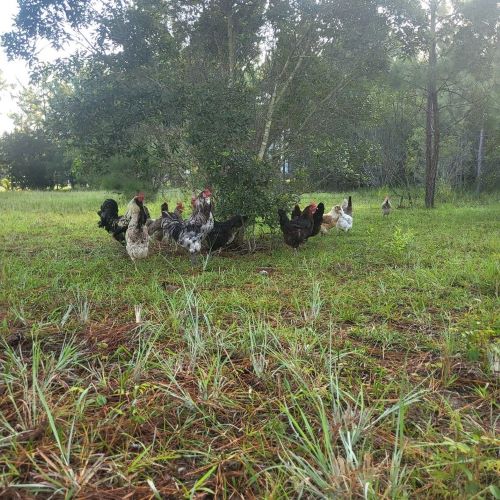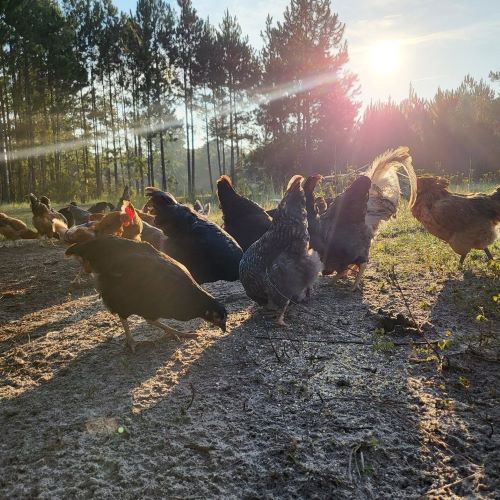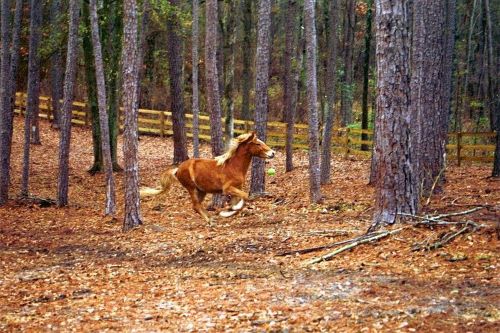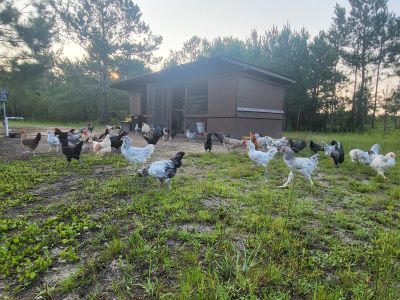Healthy and Humane: The Nutritional and Welfare Benefits of Free-Range Farming
Introduction
Free-range farming, also known as pasture-raised farming, is a method of raising animals where they have access to outdoor spaces and are allowed to roam and forage freely. Unlike conventional farming methods that confine animals to small spaces, free-range farming prioritizes animal welfare and natural behaviors.
In recent years, free-range farming has gained significant popularity among consumers who are increasingly concerned about the ethical treatment of animals and the quality of the food they consume. This shift in consumer preferences has led to a growing demand for free-range products in the market.
Improved Animal Welfare
Free-range farming allows animals to exhibit their natural behaviors, leading to improved animal welfare compared to conventional farming methods.
Comparison to Conventional Farming Methods
In conventional farming, animals are often confined to small spaces, such as cages or overcrowded barns, limiting their movement and natural behaviors. This confinement can lead to stress, aggression, and health issues among the animals.
On the other hand, free-range farming provides animals with ample space to roam, explore, and engage in natural behaviors. Chickens, for example, can freely scratch the ground, dust bathe, and forage for insects and plants. This freedom of movement and expression allows them to lead healthier and happier lives.
Positive Impact on Animal Health and Happiness
Free-range farming has a positive impact on animal health and happiness. When animals have access to a natural environment, they experience reduced stress levels, which in turn strengthens their immune systems and overall well-being.
For chickens, free-range farming results in stronger bones and muscles due to increased physical activity. They also have a lower risk of developing diseases and infections compared to chickens raised in confinement.
Furthermore, the ability to engage in natural behaviors, such as dust bathing and foraging, provides mental stimulation for animals, preventing boredom and promoting their overall happiness.
By choosing free-range farming methods, farmers prioritize the welfare of their animals, ensuring they have a higher quality of life compared to animals raised in intensive farming systems.
Sustainable Agriculture
Free-range farming is not only beneficial for animal welfare but also promotes sustainable agricultural practices. By allowing animals to roam freely and exhibit natural behaviors, free-range farming reduces the environmental impact compared to intensive farming methods.
Reduced Environmental Impact
Unlike intensive farming, where animals are confined to small spaces, free-range farming provides animals with ample space to move around and graze. This reduces the concentration of waste in one area, minimizing the risk of water and soil pollution.
Additionally, free-range farming reduces the need for artificial fertilizers and pesticides. The animals’ natural grazing behavior helps control weeds and pests, reducing the reliance on chemical interventions. This not only benefits the environment but also ensures that the food produced is free from harmful residues.
Use of Natural Fertilizers and Pest Control Methods
In free-range farming, natural fertilizers such as manure are utilized to enrich the soil. The animals’ waste is a valuable source of nutrients that can be recycled back into the land, promoting soil health and fertility.
Furthermore, free-range farmers often employ natural pest control methods. For example, chickens have a natural instinct to forage and eat insects, reducing the need for chemical insecticides. This approach not only protects the ecosystem but also ensures that the food produced is free from harmful residues.
Nutritional Benefits
When it comes to the nutritional benefits of free-range farming, one of the standout features is the superior quality of eggs produced by free-range chickens. These eggs are not only delicious but also packed with essential nutrients that are beneficial for our health.
Superior Quality of Free-Range Eggs
Free-range eggs are known for their vibrant and richly colored yolks. This is due to the varied and natural diet that free-range chickens have access to, which includes insects, plants, and other natural food sources. The diverse diet of these chickens contributes to the higher nutrient content in their eggs.
Compared to conventional eggs, free-range eggs have been found to contain higher levels of vitamins and minerals, including vitamin A, vitamin E, and omega-3 fatty acids. These nutrients play a crucial role in maintaining good health and are essential for various bodily functions.
Taste and Texture Comparison
Aside from their nutritional benefits, free-range eggs also stand out in terms of taste and texture. Many people who have tried both free-range and conventional eggs notice a distinct difference in flavor. Free-range eggs often have a richer, more robust taste compared to their conventionally farmed counterparts.
In addition to the taste, the texture of free-range eggs is often creamier and more velvety. This can be attributed to the higher fat content in the yolks, which gives them a smoother consistency when cooked.
Whether you enjoy them scrambled, poached, or in baked goods, free-range eggs can elevate the taste and texture of your favorite dishes.
Health Benefits for Consumers
When it comes to consuming meat and eggs, opting for free-range products can have significant health benefits. Here are some key points to consider:
Lower Levels of Harmful Substances
Free-range farming practices typically result in lower levels of harmful substances in meat and eggs compared to intensively farmed animals. This is primarily due to the natural and varied diet that free-range animals have access to, which helps them develop a healthier profile of nutrients.
In contrast, animals raised in intensive farming systems are often given antibiotics, hormones, and other chemicals to promote growth and prevent diseases. These substances can accumulate in their tissues and may pose potential health risks when consumed by humans.
Potential Health Risks of Intensively Farmed Products
Consuming products from intensively farmed animals can expose consumers to various health risks. The use of antibiotics in intensive farming can contribute to the development of antibiotic-resistant bacteria, making it harder to treat infections in humans.
Additionally, the excessive use of hormones and growth promoters in intensive farming has raised concerns about their potential impact on human health. Studies have suggested a possible link between the consumption of these substances and an increased risk of certain health conditions.
The Importance of Choosing High-Quality, Free-Range Products
Given the potential health risks associated with intensively farmed products, it is crucial to choose high-quality, free-range alternatives for a healthier diet. Free-range meat and eggs are known to have a more favorable nutritional profile, with higher levels of essential nutrients such as omega-3 fatty acids, vitamins, and minerals.
By supporting free-range farming, consumers can prioritize their health and well-being while also promoting ethical and sustainable agricultural practices. It is essential to look for reliable certifications and labels that guarantee the authenticity and quality of free-range products.
Economic Benefits
Free-range farming not only offers numerous benefits for animal welfare and sustainability but also presents significant economic advantages for farmers. Here, we will explore the potential for higher profits, the increasing demand for ethically produced and sustainable products, and the opportunities for niche markets and premium pricing.
Potential for Higher Profits
Free-range farming has the potential to generate higher profits compared to conventional farming methods. By allowing animals to roam freely and exhibit natural behaviors, the quality of their products, such as eggs and meat, is enhanced. This improved quality often translates into higher market value and increased consumer demand.
Increasing Demand for Ethically Produced and Sustainable Products
In recent years, there has been a significant shift in consumer preferences towards ethically produced and sustainable products. People are becoming more conscious of the impact their food choices have on animal welfare, the environment, and their own health. Free-range farming aligns with these values, making it an attractive option for consumers seeking high-quality, responsibly sourced products.
Potential for Niche Markets and Premium Pricing
One of the advantages of free-range farming is the potential to tap into niche markets. By positioning your farm as a provider of ethically produced and sustainable products, you can attract a specific segment of consumers who are willing to pay a premium for such items. This allows you to differentiate yourself from conventional farms and potentially achieve higher profit margins.
Conclusion
Free-range farming offers numerous benefits for animal welfare, sustainability, and consumer health. Throughout this article, we have explored the advantages of free-range farming and its impact on various aspects of the agricultural industry.
Benefits
First and foremost, free-range farming prioritizes animal welfare by allowing animals to exhibit natural behaviors and live in a more humane environment. Compared to conventional farming methods, free-range farming promotes healthier and happier animals.
Additionally, free-range farming contributes to sustainable agriculture. By reducing the environmental impact associated with intensive farming, free-range practices help preserve natural resources. The use of natural fertilizers and pest control methods further supports sustainable farming practices.
From a consumer perspective, free-range eggs are of superior quality. They are higher in essential nutrients, and their taste and texture are often preferred over conventional eggs. Moreover, free-range meat and eggs have lower levels of harmful substances, reducing potential health risks for consumers.
Supporting Free-Range Farming
As consumers, we have the power to support ethical and sustainable farming practices by choosing high-quality, free-range products. By opting for free-range meat and eggs, we not only contribute to animal welfare but also prioritize our own health and well-being.
It is crucial to be mindful of the source of our food and make informed choices. By supporting free-range farming, we can encourage the agricultural industry to prioritize animal welfare, sustainability, and consumer health.
The Future of Free-Range Farming
The future of free-range farming looks promising. With an increasing demand for ethically produced and sustainable products, free-range farming has the potential to thrive. Niche markets and premium pricing can provide farmers with higher profits, incentivizing more individuals to adopt free-range practices.
As consumers become more conscious of the impact of their choices, free-range farming can play a significant role in shaping the agricultural industry. By supporting this farming method, we can contribute to a more sustainable and ethical future.
Related FAQ
What is free-range farming?
Free-range farming is a method of raising animals, such as chickens and cattle, where they have access to outdoor spaces and are allowed to roam freely. Unlike conventional farming, which often involves confinement, free-range farming prioritizes animal welfare and allows the animals to exhibit their natural behaviors.
What are the benefits of free-range farming for animal welfare?
Free-range farming provides animals with ample space to move, forage, and engage in natural behaviors. This leads to improved animal welfare as they experience reduced stress levels, stronger immune systems, and lower risks of diseases and infections. The ability to express natural behaviors also enhances their mental well-being and overall happiness.
How does free-range farming contribute to sustainability?
Free-range farming reduces the environmental impact compared to intensive farming practices. With animals having more space to graze, waste concentration is minimized, which helps prevent water and soil pollution. The use of natural fertilizers, like animal manure, promotes soil health and fertility, reducing the reliance on chemical interventions.
Are free-range eggs nutritionally superior?
Yes, free-range eggs are known for their higher nutritional value. The varied and natural diet of free-range chickens results in eggs with richer, more vibrant yolks. They contain higher levels of essential nutrients such as vitamins A and E, as well as omega-3 fatty acids, which are beneficial for overall health.
How does supporting free-range farming benefit consumers?
Choosing free-range products, such as eggs and meat, benefits consumers in multiple ways. These products have lower levels of harmful substances, such as antibiotics and hormones, often found in intensively farmed items. By opting for free-range products, consumers can prioritize their health and support ethical and sustainable agricultural practices.
Thesis statement
Free-range farming offers numerous benefits for both animals and consumers, ranging from improved animal welfare to sustainable agriculture practices and the production of high-quality eggs
Key Take Away
- Free-range farming prioritizes animal welfare by allowing animals to exhibit natural behaviors and enjoy a higher quality of life compared to conventional farming methods.
- Sustainable agriculture is promoted through free-range farming, which reduces environmental impact, minimizes waste concentration, and utilizes natural fertilizers and pest control methods.
- Free-range eggs are nutritionally superior, containing higher levels of essential nutrients such as vitamins A and E, as well as omega-3 fatty acids, making them a healthier choice for consumers.
- Consumers can support ethical and sustainable practices by choosing high-quality, free-range products, contributing to a more humane and environmentally responsible future in agriculture.
- Free-range farming offers economic benefits for farmers, including the potential for higher profits, tapping into niche markets with premium pricing, and meeting the increasing demand for ethically produced and sustainable products.
Glossary
- Free-Range Farming: A method of raising animals where they have access to outdoor spaces and are allowed to roam and forage freely, prioritizing animal welfare and natural behaviors.
- Conventional Farming: A traditional farming method that often involves confining animals to small spaces, limiting their movement and natural behaviors.
- Sustainable Agriculture: An agricultural practice that aims to meet current food needs without compromising the ability of future generations to meet their needs, emphasizing environmental protection and resource conservation.
- Animal Welfare: The concern for the well-being of animals, ensuring that they are treated humanely and provided with proper care and living conditions.
- Intensive Farming: A farming method characterized by high stocking densities and the use of artificial inputs, such as antibiotics and hormones, to maximize production.
- Pasture-Raised: A synonym for free-range farming, indicating that animals have access to outdoor spaces and graze on natural vegetation.
- Omega-3 Fatty Acids: Essential polyunsaturated fatty acids that play a crucial role in maintaining heart health, brain function, and overall well-being.
- Natural Fertilizers: Organic materials, such as animal manure, compost, and crop residues, used to enrich the soil with nutrients.
- Humane Farming: An approach to farming that focuses on the ethical treatment of animals, providing them with a comfortable and stress-free environment.
- Niche Markets: Specific and specialized markets that cater to a particular segment of consumers seeking unique and high-quality products, such as ethically produced and sustainable goods.



